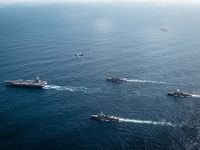While the leadership of the Middle East frequently pays lip-service to the ideal of regional unity, when it comes to trade, what happens on the ground leaves much to be desired. For while in Europe and Asia intra-regional business comprises 60 percent and 30 percent respectively, in the Middle East—including North Africa—trade among the Arab nations stands at a mere 7 percent. But the winds of change may be blowing, at least between two neighboring nations in the area.
The countries involved are the Maghreb nations of Algeria and Morocco, who have seen their bilateral trade suffer in recent years. However, Moroccan Prime Minister Abderrahmane Youssoufi has announced his nation’s willingness to promote cooperation with neighboring Algeria, saying that the purpose of the effort is to “service the glory of the two brotherly people, the glory of the Maghreb and the immunity of the Arab and Islamic nation.”
The news was welcomed in Algeria by the country’s new prime minister, Ali Benflis, who was recently appointed to the position by President Abdelaziz Bouteflika, following the sudden resignation of the previous prime minister, Ahmed Ben Bitour.
Despite the souring of relations between the two neighbors over the past few years, largely as a result of Algeria’s direct involvement in the Western Sahara dispute, Morocco has been calling for improved ties since the election of Bouteflika in 1999. The borders separating the nations have been shut down since 1994, when Algerian-born nationals were involved in a terrorist attack in Marrakesh.
It is the hope of many experts that the Moroccan and Algerian governments’ openly expressed intention to improve their relations will provide a boost to the dire state of both economies. Morocco's trade balance deficit during the first six months of year 2000 sank 39.8 percent to $2.26 billion, compared to the same period last year.
Morocco is also under fire from the European Community about its allegedly lax attitude toward the cannabis trade. Some estimate that the sale of cannabis today accounts for about two-thirds of Morocco's real exports.
Agriculture alone accounts for nearly 20 percent of Moroccan GDP and employs some 40 percent of the labor-force. Weather, and particularly the amount of rainfall, is a significant economic determinant that can cause GDP to vary by as much as 10 percent per year. Stated plainly, Morocco’s economy is dependent on water for its survival.
By contrast, neighboring Algeria is dependent on oil exports. With proven oil reserves of approximately 9,200 million barrels, and gas reserves of 160 trillion cubic feet (tcf), the hydrocarbons sector is Algeria's economic lifeblood. It accounts for around 97 per cent of export earnings, at least 35 per cent of GDP, and provides more than half of government revenues.
Surging oil prices have helped the nation keep its head above water, but the lack of economic diversification leaves its vulnerable. Algerian President Bouteflika made a landmark trip to France in June, partly in search of financial assistance, but he reportedly returned home empty-handed.
Algeria’s precarious political environment continues to stymie its quest for economic stability. Although the mood in the country today is generally clam, commentators say that progress toward reconciliation is still necessary before foreign companies will be persuaded that Algeria has left its war-torn past behind and is now a safe place to conduct business. This skepticism is one of the reasons why unemployment continues to plague the nation. Currently, it stands at nearly 30 percent.
Algeria’s tourism sector is one area of potential growth. In 1999, the number of tourists visiting the nation expanded by 18 percent to 2.4 million. The government plans to grow this number to 4 million by 2003.
Privatization of state-owned companies appears essential to both countries. As Morocco continues to open up its power and telecommunications sectors, and Algeria does the same with its energy and pharmaceutical industries, experts expect more foreign companies to take an interest in these nations.
Still, many of the economic solutions lie closer to home. Thus as Algeria and Morocco seek to find their respective places in the global economy, experts contend a tightly-woven economic partnership between the two nations is the key to the future. – (Albawaba-MEBG)
© 2000 Mena Report (www.menareport.com)







